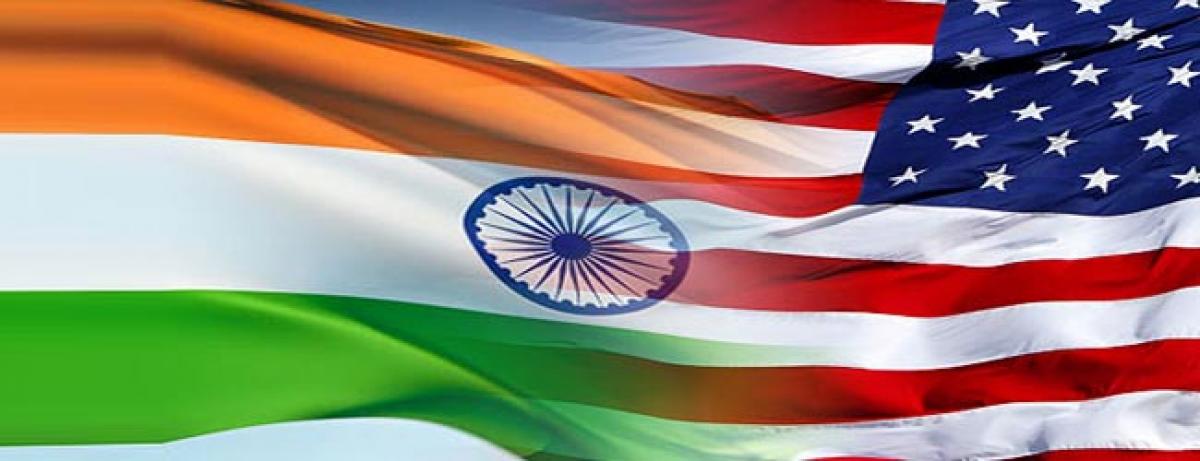Live
- Chanchalguda Jail Officials Say They Haven't Received Bail Papers Yet, Allu Arjun May Stay in Jail Tonight
- BJP leaders present evidence of illegal voters in Delhi, urge EC for swift action
- Exams will not be cancelled: BPSC chairman
- Nagesh Trophy: Karnataka, T.N win in Group A; Bihar, Rajasthan triumph in Group B
- YS Jagan condemns the arrest of Allu Arjun
- Economic and digital corridors to maritime connectivity, India and Italy building vision for future, says Italian Ambassador
- SMAT 2024: Patidar's heroics guide Madhya Pradesh to final after 13 years
- CCPA issues notices to 17 entities for violating direct selling rules
- Mamata expresses satisfaction over speedy conviction in minor girl rape-murder case
- Transparent Survey Process for Indiramma Housing Scheme Directed by District Collector
Just In

The \'in principle\' agreement between India and US to conclude an agreement for providing military logistics may prove beneficial for India as long as it is clear that Americcan troops will not be stationed on Indian soil, experts say.
New Delhi: The 'in principle' agreement between India and US to conclude an agreement for providing military logistics may prove beneficial for India as long as it is clear that Americcan troops will not be stationed on Indian soil, experts say.
The announcement on a Logistics Exchange Memorandum of Agreement (LEMOA) that came during US Defence Secretary Ashton Carter's just-concluded India visit is already facing political skepticism, which was expected for the agreement that has been pending for 10 years, with the former Congress-led United Progressive Alliance (UPA) government soft-pedalling on it.
It also comes at a time when US has been vocal about the growing Chinese activities in the South China Sea and has repeatedly on stressed 'freedom of navigation'.
India on the other hand has been expressing concerns over terror emanating from Pakistan, with the proximity between Pakistan and China being another issue.
The major concern expressed by different political parties for long remained that India, which had chosen to remain non-aligned post independence and through the Cold War period, must not enter the NATO block by supporting US troops.
Former defence minister and Congress leader AK Antony went to the extent of terming the agreement "disastrous", while the Left has also opposed it.
However, as both sides -- Carter and his Indian counterpart, Manohar Parrikar -- clarified, the renamed agreement LEMOA (it was previously the Logistics Support Agreement) would not involve the presence of US troops in India.
The agreement, according to available information, will be country-specific for India and will focus on providing support that will primarily include food, fuel and stores.
Former Indian Army chief General V.P. Malik said the agreement is likely to be beneficial for India.
"This agreement has been floating around for ten years, but India had reservations. Now that the two sides have agreed, it is possible that the agreement has been modified," General Malik, who was in office from 1997 to 2000, a period which included the 1999 Kargil conflict, told IANS.
"The basic opposition was that we do not want American troops to be stationed in India, nor do we want to support the process of the forces striking somewhere else," he added.
"I feel the Indian and US governments have agreed on a draft that meets these two requirements. It is a useful agreement as long as we are not seen to be supporting americans fighting somewhere else," Gen. Malik noted.
Strategic analyst C. Uday Bhaskar concurred and said the LEMOA would benefit India in the long term.
"It is an India-specific agreement. I do think it will be in India's interest in the long term in terms of being able to obtain fuel and logistics at short notice," Bhaskar, who is the director of think tank Society for Policy Studies, told IANS.
"At a time when India needs to maintain its presence in the region, this is a useful traction for India," he said.
Bhaskar also underlined that the agreement, when it comes into force, is unlikely to be binding in nature and India will always have the right to refuse assistance.
"We are not getting stuck in NATO," he clarified.
The US had first proposed an India-specific LSA in 2004 at the sixth meeting of the India-US Defence Policy Group.
This was a version of the Acquisition and Cross-Servicing Agreement (ACSA), which the US has with several NATO nations, something that has raised concern.
India has, in the past, provided logistics support to the US. During the 1990-91 Gulf War, prime minister Chandra Shekhar's coalition government provided overflight rights to US planes, and even permitted refueling, but revoked it after protests.
During the 2004 tsunami, US support came in handy with India lacking the capability to provide assistance to the vast affected areas, as it did after 2015 Nepal earthquake.
Both Gen. Malik and Bhaskar highlighted this aspect.
"During the tsunami, there was good coordination and US helped, although US ships did not come on our side," Gen. Malik said.
Bhaskar said India lacked resources to deploy on multiple fronts after the tsunami.
"During the Nepal earthquake, US had the digital maps and geo-spatial data which came in handy," Bhaskar added.

© 2024 Hyderabad Media House Limited/The Hans India. All rights reserved. Powered by hocalwire.com







